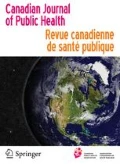Abstract
Background
Travel Counsellors may be a source of health advice to travellers and might influence travellers’ decisions to seek consultation from health professionals. We examined the travel health advice that Alberta travel counsellors currently provide their clients and assessed their health knowledge and practices.
Methods
Cross-sectional postal survey of travel counsellors who book international trips identified from a random sample of Alberta travel agencies in 2000.
Results
The response rate was 54.4%. Over 80% of respondents routinely provide clients with general health advice, and approximately 70% advise on malaria risk and vaccines required for travel. The risk of malaria was correctly identified by 72% of the respondents who frequently book clients to malarious destinations. Most respondents (79%) thought they should be involved in promoting the health of international travellers. Their preference was to provide health advice to their clients (90%) rather than refer them to a health professional (67%).
Conclusions
A large proportion of Alberta travel counsellors provided travel-related health advice to clients. Their preferred role of counselling rather than referring conflicts with the recommendations of the International Society of Travel Medicine.
Résumé
Contexte
Les conseillers touristiques peuvent être une source de conseils de santé pour les voyageurs, qu’ils peuvent encourager à consulter des professionnels de la santé. Nous avons examiné les conseils que donnent actuellement les conseillers touristiques de l’Alberta à leurs clients en matière de médecine des voyages, afin d’évaluer les connaissances médicales et les pratiques de ces conseillers.
Méthode
Enquête postale transversale auprès de conseillers touristiques qui réservent des voyages à l’étranger, choisis à partir d’un échantillon aléatoire d’agences de voyage albertaines en 2000.
Résultats
Nous avons obtenu un taux de réponse de 54,4 %. Plus de 80 % des répondants donnaient systématiquement à leurs clients des conseils de santé généraux, et environ 70 % leur donnaient des conseils sur le risque de contracter la malaria et sur les vaccins requis en voyage. Le risque de malaria a été correctement souligné par 72 % des répondants qui faisaient souvent des réservations vers des destinations où cette maladie est endémique. La plupart des répondants (79 %) considéraient qu’il était de leur devoir de promouvoir la santé des voyageurs internationaux. Ils préféraient cependant donner des conseils de santé à leurs clients (90 %) plutôt que de les aiguiller vers un professionnel de la santé (67 %).
Conclusions
Une grande proportion des conseillers touristiques de l’Alberta donnent à leurs clients des conseils de santé liés aux voyages. Le fait qu’ils préfèrent conseiller les voyageurs plutôt que de les orienter est cependant contraire aux recommandations de la International Society of Travel Medicine.
Similar content being viewed by others
References
Statistics Canada. Travel between Canada and other countries 1997. Ottawa, 1998.
Bryant HE, Csokonay WM, Love M, Love EJ. Self-reported illness and risk behaviours amongst Canadian travellers while abroad. Can J Public Health 1991;82:316–19.
Cossar JH, Reid D, Fallon RJ, Bell EJ, Riding MH, Follett EA, et al. A cumulative review of studies on travellers, their experience of illness and the implications of these findings. J Infect 1990;21:27–42.
McIntosh IB, Reed JM, Power KG. The impact of travel acquired illness on the world traveller and family doctor and the need for pre-travel health education. Scott Med J 1994;39:40–44.
Hargarten SW, Baker TD, Guptill K. Overseas fatalities of United States citizen travellers: An analysis of deaths related to international travel. Ann Emerg Med 1991;20:622–26.
Steffen R. Travel medicine - prevention based on epidemiological data. Trans R Soc Trop Med Hyg 1991; 85:156–62.
Advice for Travellers. Med Lett Drugs Ther 1999;41:39–42.
Centers for Disease Control and Prevention. Health Information for International Travel 1999–2000. DHHS, Atlanta, GA.
Dawood RM. Preparation for travel. Br Med Bull 1993;49:269–84.
Hill DR, Pearson RD. Health advice for international travel. Ann Intern Med 1988;108:839–52.
dos Santos CC, Anava A, Keystone JS, Kain KC. Survey of use of malaria prevention measures by Canadians visiting India. CMAJ 1999;160:195–200.
Duval B, De Serre G, Shadmani R, Boulianne N, Pohani G, Naus M, et al. A population-based comparison between travellers who consulted travel clinics and those who did not. J Travel Med 2003;10:4–10.
Provost S, Soto JC. Predictors of pre-travel consultation in Tourists from Quebec (Canada). J Travel Med 2001;8:66–75.
Grabowski P, Behrens RH. Provision of health information by British travel agents. Trop Med Int Health 1996;1:730–32.
Ivatts SL, Plant AJ, Condon RJ. Travel health: Perceptions and practices of travel counsellors. J Travel Med 1999;6:76–80.
Provost S, Gaulin C, Piquet- Gauthier B, Emmanuelli J, Venne S, Dion R, et al. Travel agents and the prevention of health problems among travellers in Quebec. J Travel Med 2002;9:3–9.
Canadian Institute of Travel Counsellors. Canadian Institute of Travel Counsellors Code of Ethics. https://doi.org/www.citc.ca/who.html#ethics. Accessed June 18, 2003.
Anonymous. Personnel guide to Canada’s travel industry: Spring/summer 1999 edition. Toronto: Baxter Publishing Co, 1999.
Colton T. Statistics in Medicine. First edition. Boston: Little, Brown and Company, 1974.
Epi info, version 6: A word-processing, data-base, and statistics program for public health on IBMcompatible microcomputers. Atlanta, Georgia: Centers for Disease Control and Prevention, 2000.
International Society of Travel Medicine. A consensus statement on providing travel health advice. October 22, 1996. https://doi.org/www.istm.org/concensus.html. Accessed November 10, 1999.
Author information
Authors and Affiliations
Corresponding author
Additional information
Acknowledgements: This study was supported by an unconditional grant-in-aid from SmithKline Beecham Pharma and from the R&D Committee of the Calgary Health Region.
Rights and permissions
About this article
Cite this article
McAllister, C.D., Russell, M.L. Travel Counsellors and Travel Health Advice. Can J Public Health 95, 142–145 (2004). https://doi.org/10.1007/BF03405783
Received:
Accepted:
Published:
Issue Date:
DOI: https://doi.org/10.1007/BF03405783




